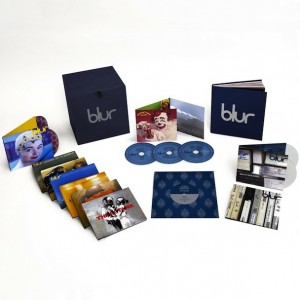Blur
21: The Box (EMI)
[rating: 4.5/5]
There seemed a strange finality to British band Blur’s announcement back in April that they would be issuing this wonderfully exhaustive and elaborate box set. The future of the band seemed all but done for when frontman Damon Albarn admitted they’d not only abandoned work on a much anticipated eighth studio album but also that their upcoming performance at London’s Hyde Park, part of the closing festivities for the 2012 Olympics, will “in all likelihood be our last.”
In a way, then, 21 marks the formal end of the career of one of the best bands England has ever produced. Ostensibly issued to celebrate the band’s 21st birthday, it now seems that it might also be its last release. Thanks to the heady days of the great Blur vs. Oasis Britpop Wars that constituted much of the mid-to-late 1990s, Blur will forever be linked with Oasis, with whom they did battle for chart success and critical acclaim for a good many years. Both bands, of course, were excellent. But, in the end, one tended to fall on either end of the spectrum: you were a Blur fan or an Oasis fan, first and foremost, and I’ll unashamedly admit that I was the former.
For both the longtime fan and the newcomer alike, 21 pretty much undeniably constitutes an embarrassment of riches. It offers up each of the band’s studio albums – 1991’s Leisure, 1993’s Modern Life is Rubbish, 1994’s Parklife, 1995’s The Great Escape, 1997’s Blur, 1999’s 13 and 2003’s Think Tank – all digitally re-mastered, plus an additional seven CDs of bonus material, three of which are DVDs of live performances and other footage.
The other four discs are rarities and b-sides, some previously released and others released here for the first time. Among them there are more than a few gems to unearth, some of which date back to the band’s earliest days and first incarnation, as a garage band named Seymour. Albarn’s always had a capacity for bleakness as much as he’s had one for wry humour, so it’s no surprise, really, to come across a track called ‘Sir Elton John’s Cock.’ Other highlights include the lovely old-world near-waltz of ‘Hope You Find Your Suburbs,’ the acoustic guitar-driven folk-pop of ‘Alex’s Song’ and the lo-fi demo version of ‘Beetlebum’ that boasts Albarn singing alternate lyrics.
Given the sheer scale of 21, it’s also inevitable that some of its offerings might have best been left stashed in a vault somewhere. Even I could have done without three versions of b-side ‘Red Necks,’ a mocking faux-country track that was originally released on the single ‘End of a Century,’ taken from Parklife. Similarly, the almost 12-minute long version of ‘She’s So High,’ recorded in a grating, strangulated near-falsetto, is so unbearably awful it might well have been very effectively used as a form of auditory torture on detainees at Guantanamo Bay.
Still, this is an offering that is much a time capsule as it is a memorial. Though Blur may indeed be no more a couple of weeks from now, the world will always have their music and this is a brilliant compilation of almost everything they’ve ever written and recorded, from their earliest days up through to their most recent offerings.
Over the course of their career, Blur was so much more than the 90s Britpop band so many pegged them as. Though it alienated many of those fans, they explored myriad genres, sometimes effortlessly succeeding and at other times failing, but always admirably so. Throughout it all, however, they’ve remained fearlessly and unequivocally themselves. It’s doubtful we’ll see a band the likes of them again and this is a fitting remembrance – it, like their music, is both a behemoth and a thing of beauty and always brilliantly so.
Heidi Maier.




